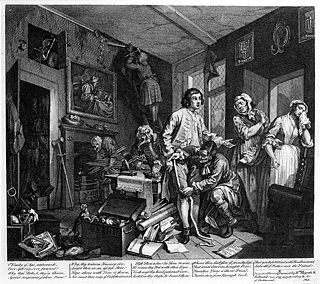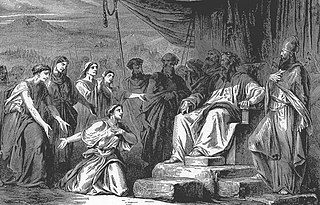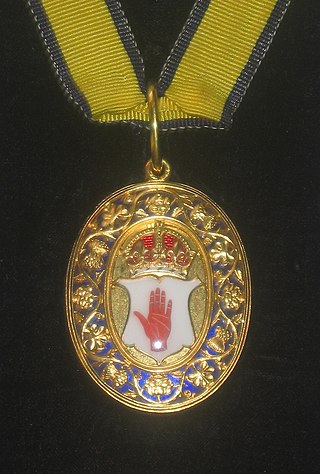
Inheritance is the practice of receiving private property, titles, debts, entitlements, privileges, rights, and obligations upon the death of an individual. The rules of inheritance differ among societies and have changed over time. Officially bequeathing private property and/or debts can be performed by a testator via will, as attested by a notary or by other lawful means.

The Daughters of Zelophehad were five sisters – Mahlah, Noa, Hoglah, Milcah, and Tirzah – mentioned in the biblical Book of Numbers. They lived during the Israelites' Exodus from Egypt as they prepared to enter the Promised Land and who raised before the Israelite community the legal case of a woman's right and obligation to inherit property in the absence of a male heir in the family. Zelophehad, a man of the Tribe of Manasseh, had five daughters but no sons, and therefore no male heirs.

A baronet or the female equivalent, a baronetess, is the holder of a baronetcy, a hereditary title awarded by the British Crown. The title of baronet is mentioned as early as the 14th century; however, in its current usage it was created by James I of England in 1611 as a means of raising funds for the crown.
Primogeniture is the right, by law or custom, of the firstborn legitimate child to inherit the parent's entire or main estate in preference to shared inheritance among all or some children, any illegitimate child or any collateral relative. In most contexts, it means the inheritance of the firstborn son ; it can also mean by the firstborn daughter, or firstborn child.

Earl Mountbatten of Burma is a title in the Peerage of the United Kingdom, created in 1947 for Rear Admiral Louis Mountbatten, who in 1946 had been created the first Viscount Mountbatten of Burma. He was later promoted to Admiral of the Fleet.

Intestacy is the condition of the estate of a person who dies without having in force a valid will or other binding declaration. Alternatively this may also apply where a will or declaration has been made, but only applies to part of the estate; the remaining estate forms the "intestate estate". Intestacy law, also referred to as the law of descent and distribution, refers to the body of law that determines who is entitled to the property from the estate under the rules of inheritance.
In English law, a fee simple or fee simple absolute is an estate in land, a form of freehold ownership. A "fee" is a vested, inheritable, present possessory interest in land. A "fee simple" is real property held without limit of time under common law, whereas the highest possible form of ownership is a "fee simple absolute", which is without limitations on the land's use.
In English common law, fee tail or entail, or tailzie in Scots law, is a form of trust, established by deed or settlement, that restricts the sale or inheritance of an estate in real property and prevents that property from being sold, devised by will, or otherwise alienated by the tenant-in-possession, and instead causes it to pass automatically, by operation of law, to an heir determined by the settlement deed. The terms fee tail and tailzie are from Medieval Latin feodum talliatum, which means "cut(-short) fee". Fee tail deeds are in contrast to "fee simple" deeds, possessors of which have an unrestricted title to the property, and are empowered to bequeath or dispose of it as they wish. Equivalent legal concepts exist or formerly existed in many other European countries and elsewhere; in Scots law tailzie was codified in an Act of 1685 which in 1896 was given a short title as an Entail Act.
The hereditary peers form part of the peerage in the United Kingdom. As of August 2023, there are 805 hereditary peers: 30 dukes, 34 marquesses, 189 earls, 110 viscounts, and 442 barons.
The British peerage is governed by a body of law that has developed over several centuries. Much of this law has been established by a few important cases, and some of the more significant of these are addressed in this article.

Succession to the British throne is determined by descent, sex, legitimacy, and religion. Under common law, the Crown is inherited by a sovereign's children or by a childless sovereign's nearest collateral line. The Bill of Rights 1689 and the Act of Settlement 1701 restrict succession to the throne to the legitimate Protestant descendants of Sophia of Hanover who are in "communion with the Church of England". Spouses of Catholics were disqualified from 1689 until the law was amended in 2015. Protestant descendants of those excluded for being Roman Catholics are eligible.
A cadet branch consists of the male-line descendants of a monarch's or patriarch's younger sons (cadets). In the ruling dynasties and noble families of much of Europe and Asia, the family's major assets have historically been passed from a father to his firstborn son in what is known as primogeniture; younger sons, the cadets, inherited less wealth and authority to pass on to future generations of descendants.
In property law of the United Kingdom and the United States and other common law countries, a remainder is a future interest given to a person that is capable of becoming possessory upon the natural end of a prior estate created by the same instrument. Thus, the prior estate must be one that is capable of ending naturally, for example upon the expiration of a term of years or the death of a life tenant. A future interest following a fee simple absolute cannot be a remainder because of the preceding infinite duration.
Hereditary titles, in a general sense, are nobility titles, positions or styles that are hereditary and thus tend or are bound to remain in particular families.
International tax law distinguishes between an estate tax and an inheritance tax. An inheritance tax is a tax paid by a person who inherits money or property of a person who has died, whereas an estate tax is a levy on the estate of a person who has died. However, this distinction is not always observed; for example, the UK's "inheritance tax" is a tax on the assets of the deceased, and strictly speaking is therefore an estate tax.
An order, line or right of succession is the line of individuals necessitated to hold a high office when it becomes vacated, such as head of state or an honour such as a title of nobility. This sequence may be regulated through descent or by statute.
In inheritance, a hereditary successor is a person who inherits an indivisible title or office after the death of the previous title holder. The hereditary line of succession may be limited to heirs of the body, or may pass also to collateral lines, in case of extinction of heirs of the body, depending on the succession rules. These concepts are in use in English inheritance law.
The South African law of succession prescribes the rules which determine the devolution of a person's estate after his death, and all matters incidental thereto. It identifies the beneficiaries who are entitled to succeed to the deceased's estate, and the extent of the benefits they are to receive, and determines the different rights and duties that persons may have in a deceased's estate. It forms part of private law.
Inheritance law regulates the financial consequences that arise as a result of the death of individuals, as well as the subsequent transfer of their assets. The governing legislation in Bulgaria that regulates the legal aspects of this subject is the Bulgarian Inheritance Act.
Intestate succession in South African law takes place whenever the deceased leaves property which has not been disposed of by valid testamentary instrument. In other words, the law of intestate succession applies only:





